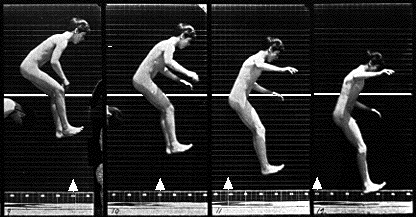I've been reading some of the FABULOUS essays on JSTOR that I got typing in "cyborg communities." I highly recommend checking out this resource of criticism and insight if you want to take this idea further.
One specific article that I want to share a few ideas from is called "Thoughts on the Status of the Cyborg: On Technological Socialization and Its Link to the Religious Function of Popular Culture" by Brenda Brasher. This text talks about Frankenstein, Metropolis, Roland Barthes on Einstein as cyborg (though he didn't use the term), U.S. techno-celebratory popular culture's affects on the future of religious symbolism and continued existence, Star Trek, Blade Runner, Marx and more.
On the origin of the world cyborg:
"How has life managed to imitate art in this way? The cyborg's bridge across the fictional/real divide that enabled it to be replicated as both fiction and fact, and the study of its character to be approached both as mythology and anthropology have a fascinating history. Intriguingly, although the cyborg concept initially developed in the arts [the aesthetic idea], the term cyborg originated in the sciences. Its first appearance was in 1960 in a speculative article on the future of space travel authored by two research scientists (Clynes and Kline). Rather than developing human-friendly environments to travel through space, Clynes and Kline made the unorthodox proposal that scientists try to alter the human body so it could thrive in space. They reffered to these space-adapted humans as "cyborgs." In the sciences the term stuck. As advances in medical technologies enabled medical specialists to replace certain defective or deficient human organs and limbs with artificial or animal implants, the specialists involved referred to implant recipients as cyborgs."
This piece also discusses the ideas of Naomi Goldenberg, whose addition to the cyborg discourse is much less celebratory than Haraway's Manifesto:
"Contra Haraway,Goldenberg decried the englarging role of machines in human socialization. The philosophical and religoius heritage of the West... leaves Westerners predisposed to form harmful attitudes toward the tecnologies overtaking their lives. This heritage has taught us 'that human life is a rough copy of something out there- something better, wiser and purer...' Consequently, Westerners possess a cultural proclivity to respond to machines not as tools to use but as role models to emulate. As people act upon this proclivity, the isolation and loneliness of modern life are being increased. Given the pro-technology direction of Western development, Goldenberg's prediction for the future is a somber one: 'We are, I think, engaged in a process of making one another disapear by living more and more of our lives apart from other humans, in the company of machines."
Brasher engages with this dialectic, reconciling the two ideas somewhat, with the idea that cyborg artist-technicians, like religious movements of the past, will encourage/mandate the capitalist marketplace be ethical issues of privacy, public policy, etc become more intertwined with our cyborg selves. The piece ends with a question:
"Will consciously claiming the cyborg metaphor as an intentionally-bodied self foster the formation of the micro- and macro-political efforts necessary to restrain and direct techno-capitalism to address the common good, or will it instead work to undermine them? Here, the religious function of popular culture may play a pivoal role. Because of their profound intimacy with technology, those who produce the artifacts of mass-mediated culture are among those most keenly cognizant of technology's many pitfalls....they might generate sufficient symbolic cyber-manna to nourish the development of a moral consensus on technological ethics."
Some other good essays are "Tiptree and Haraway: The Reinvention of Nature"by Judith Genova and "The Commodification of the Body and Its Parts" by Lesley Sharp- an anthropological perspective of scientific discourse about the body
